PENGEMBANGAN VARIAN MOTIF BATIK GIRILAYU SEBAGAI DIVERSIFIKASI PRODUK FESYEN DAN HOME DÉCOR BAGI KELOMPOK BATIK GIRIARUM
Main Article Content
Abstract
Girilayu Batik as one of the leading creative industries in Karanganyar Regency has currently experienced quite rapid progress. Several studies and community service activities in an effort to increase product capacity and quality have been carried out, but along with the increasingly tight competition in the fashion market, product diversification is still needed to be adjusted to the functions and trends that are currently developing. The motifs and functions of batik products in Girilayu are considered to need development in order to reach the market from a different side. This community service activity is an effort to open up wider batik market opportunities. The purpose of this activity is so that creative batik industry players in the Giriarum Batik Group, Girilayu Village, are able to create batik motifs for fashion and home décor which are currently starting to be popular. The method used to achieve this goal is in the form of training and mentoring in exploring creative ideas and creating batik motifs that are in accordance with the tastes of potential consumers. Training and mentoring for batik product diversification which will be carried out supported by the technical skills already possessed by batik craftsmen in the Giriarum Batik Group will be able to create products that are in demand by consumers. Fashion products other than clothes and fabrics as well as home décor products will differentiate batik competitors, so that market opportunities are wide open.
Downloads
Article Details

This work is licensed under a Creative Commons Attribution-ShareAlike 4.0 International License.
License and Copyright Agreement
In submitting the manuscript to the journal, the authors certify that:
- Their co-authors authorize them to enter into these arrangements.
- The work described has not been formally published before, except as an abstract or part of a published lecture, review, thesis, or overlay journal. Please also carefully read Abdi Seni's Posting Your Article Policy at https://jurnal.isi-ska.ac.id/index.php/abdiseni/about/editorialPolicies#peerReviewProcess
- That it is not under consideration for publication elsewhere,
- That its publication has been approved by all the author(s) and by the responsible authorities – tacitly or explicitly – of the institutes where the work has been carried out.
- They secure the right to reproduce any material already published or copyrighted elsewhere.
- They agree to the following license and copyright agreement.
Copyright
Authors who publish with Abdi Seni agree to the following terms:
- Authors retain copyright and grant the journal right of first publication with the work simultaneously licensed under a Creative Commons Attribution License (CC BY-SA 4.0) that allows others to share the work with an acknowledgment of the work's authorship and initial publication in this journal.
- Authors can enter into separate, additional contractual arrangements for the non-exclusive distribution of the journal's published version of the work (e.g., post it to an institutional repository or publish it in a book), with an acknowledgment of its initial publication in this journal.
- Authors are permitted and encouraged to post their work online (e.g., in institutional repositories or on their website) before and during the submission process, as it can lead to productive exchanges and earlier and greater citation of published work.
Licensing for Data Publication
Abdi Seni uses a variety of waivers and licenses that are specifically designed for and appropriate for the treatment of data:
- Open Data Commons Attribution License, http://www.opendatacommons.org/licenses/by/1.0/ (default)
- Creative Commons CC-Zero Waiver, http://creativecommons.org/publicdomain/zero/1.0/
- Open Data Commons Public Domain Dedication and Licence, http://www.opendatacommons.org/licenses/pddl/1-0/
Other data publishing licenses may be allowed as exceptions (subject to approval by the editor on a case-by-case basis). They should be justified with a written statement from the author, which will be published with the article.
Open Data and Software Publishing and Sharing
The journal strives to maximize the replicability of the research published in it. Authors are thus required to share all data, code, or protocols underlying the research reported in their articles. Exceptions are permitted but must be justified in a written public statement accompanying the article.
Datasets and software should be deposited and permanently archived in inappropriate, trusted, general, or domain-specific repositories (please consult http://service.re3data.org and/or software repositories such as GitHub, GitLab, Bioinformatics.org, or equivalent). The associated persistent identifiers (e.g., DOI or others) of the dataset(s) must be included in the article's data or software resources section. Reference(s) to datasets and software should also be included in the article's reference list with DOIs (where available). Where no domain-specific data repository exists, authors should deposit their datasets in a general repository such as ZENODO, Dryad, Dataverse, or others.
Small data may also be published as data files or packages supplementary to a research article. However, the authors should prefer a deposition in data repositories in all cases.
